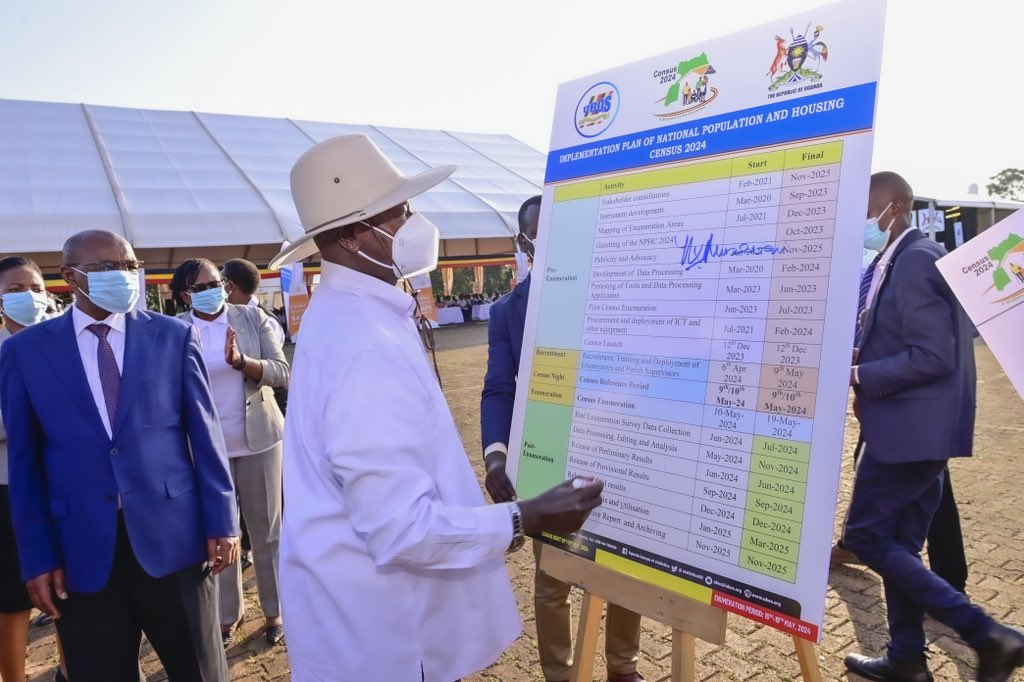The Uganda Bureau of Statistics (UBOS) yesterday launched the first-ever digital National Population and Housing Census aimed at greatly minimizing errors which have been related to paper-based data entries in the previous exercises.
The digitally conducted census is also expected to shorten the time of releasing the final data, expected out in December 2024.
Presenting the 2024 cense undertaking during the launch of the national population and housing census (NPHC) at Kololo independence grounds, the executive director of Uganda bureau of statistics, Dr Chris N. Mukiza said: “This is going to be the first digital census and the 11th Uganda census, sixth post-independence census and third census done by Uganda bureau of statistics.”
Dr Mukiza said preliminary results of the 2024 national population and housing census will be out in June 2024, provisional results will be in September 2024 and the final results will be released in December 2024 unlike in the past when the census result could take two to three years.
On funding, Dr Mukiza said this is the first time the government is funding 98 percent of national population and housing census 2024 with the shs320.9 billion and the have already spent shs 11 billion and they will have a deficit of shs13, where they development partners to come in and support.
“This is the first time the government is providing a large share of funding so we are becoming self-sufficient unlike in the past in 2014 the government provided 75 percent,” he said.
He said the enumeration period will be starting on May 10 to 20 May 2024 and requested that the ministry of Education and Supports ask schools to close during this period so that the students/pupils can get counted.
Meanwhile President Museveni who was the chief guest and also officially launched this first digital census, urged Ubos and other policy makers involved in the exercise to use clear and understandable language for the local citizens.
The head of the state also used the launch to clarify that the census is the night of May 9th, 2024 and not the night of May 9th and 10th as the statistics body had put it.
“Stop being other people, be yourself, the Europeans live in a maze. “He said
He went and urged the general public to stay at home on May 10, which has since been declared a public holiday to enable the enumerators to count each one of them. “The counting aims at knowing how many people, where do they live, how well off they are, what do they own,” he said.
The President added: “…We count people so that the government can plan for you better, when these figures come in, they will help us to plan. The purpose of counting is planning.”
Further, Mr Museveni said he is happy with the current population growth adding that Africa was 12 times below the population size of India but it has just overtaken India.
Delivering remarks of the UN resident coordinator, Ms Susan Ngongi Namondo, Ms gift Malunga, UNFPA country representative said globally, every 10 years, the UN announces a round of censuses, during which each country is expected to conduct a complete enumeration of its population.
Ms Ngongi Namondo said the current round, which started in 2015 and ends in 2024, is nearing its conclusion
“Your Excellency, it is only with adequate, timely and accurate data that we can be able to tell our development story and formulate policies that respond to the current and future development challenges, threats and opportunities,” she said.
Adding, “In today’s fast paced world with an ever-changing development context, multiple vulnerabilities and risks to sustainable development, the demand for reliable and up-to-date data to inform decision making at all levels can only grow stronger.”
Giving a live example, Ms Malunga said Uganda has a youthful, energetic and fairly educated population that is facing a myriad of challenges, but also with the potential to exploit the many opportunities in their communities and elsewhere.
“To make informed investments in this young demographic, we require accurate and timely information about their demographics, locations, and activities,” she said.
She said the census provides this vital data, empowering the government, development partners and private sector players to tap into this valuable human capital resource and unlock its potential for national development.
She further commended the government’s bold embrace of the power of technology and innovation and stated that by opting for digital censuses, Uganda joins a growing trend across Africa and globally in leveraging modern technology to generate data and evidence, including through the censuses, in the most efficient, accurate, and transparent manner.
She stressed that in countries that recently concluded their censuses preliminary results have been produced in less than two months-which is unimaginable with traditional paper-based methods.
“We, the United Nations system and the entire development partner community, are incredibly proud to walk this journey with the government in this endeavour. We have come together to offer our support and expertise ensuring that Uganda’s first digital censuses are conducted successfully, and we will continue to support the national statistical system in other endeavours,” she said.
“As part of our commitment, 12 UN agencies operating in Uganda have collaborated with the Uganda bureau of statistics to develop a three-year $42 million (approximately shs160 billion) joint programme for data and statistics that will be launched next month.
Partners are also supporting ongoing efforts to upgrade administrative data systems using cutting-edge technology to enhance data quality and utility in informing policy and planning processes,” she added.
She said these are just a few of the many initiatives through which development partners are supporting generation, dissemination, and use of data statistics in Uganda.
Speaking at the same launch, State Minister for planning, Amos Lugolobi said the 2024 census will be the sixth to be conducted since Uganda got independence in 1962, adding that in particular, it will be the third to conduct by Ubos, which was established by an act Parliament in 1998 and will be the first to be paperless.
“The census data is useful in determining how to appropriately allocate scare resources, informs policy formulation and the findings of a census help policy makers to measure how good policy decisions are, how sensible they are and the duration for which those decisions can be trusted,” he said.
In his remark, the chairperson of Ubos, Dr albert Byamugisha said: “your Excellency, the national population and housing census is one major programme that we at Uganda bureau of statistics look forward to conducting since it plays a critical role in guiding evidence based planning, policy formulation, and programme implementation as well as monitoring development progress in line with national goals and objectives and demands to reach to all our potential stakeholders so that together we deliver a quality and acceptable national product.”
Adding, “I am pleased to inform you that the forthcoming census will mark a historic milestone as the first-ever digital census in Uganda with substantial financial support from your NRM government. A total of 120,000 youth and other Ugandans will be employed directly and indirectly during the census exercise. The private sector will benefit directly from the exercise.”








